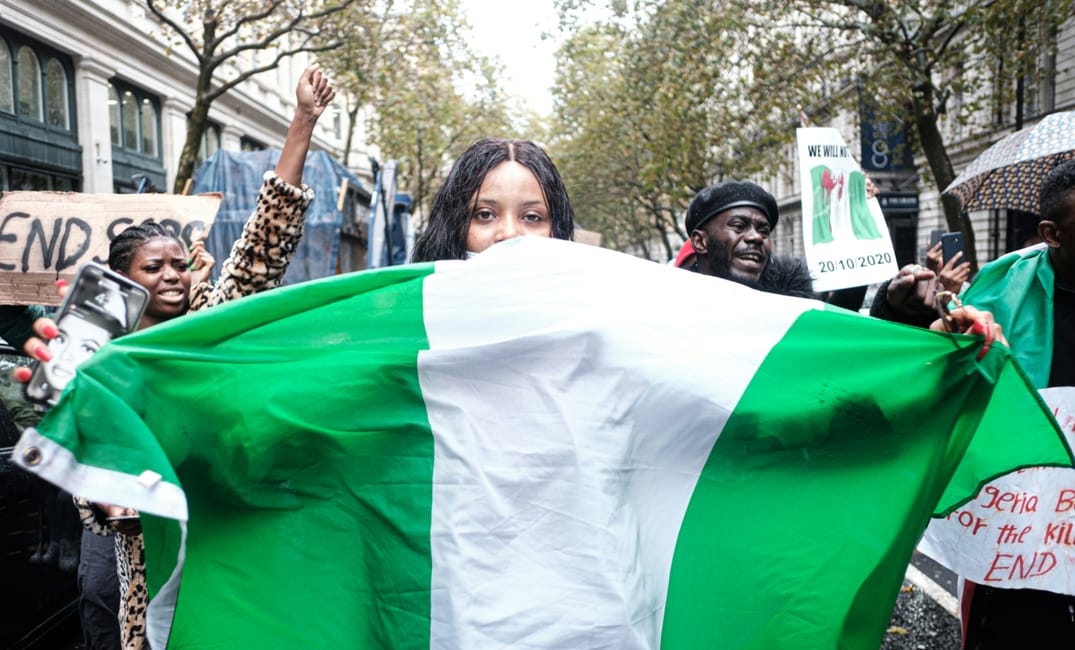Ellie Agu Benson
What are the #EndSARS protests?
Stories of police brutality have filled our newspapers and our newsfeed over this summer. The video of George Floyd is still fresh in the minds of many people across the world but on Friday 8th October a new video of police brutality emerged. The video showed two young men being dragged into a hotel and shot by a policeman. However, this time it was not in America but in Nigeria.
The policeman doing the shooting was part of SARS, standing for Special Anti-Robbery Squad, a unit supposedly dedicated to dealing with robbery, motor vehicle theft, kidnapping and firearms. However, SARS has done very little in the prevention of crime, only to proliferate it. The unit has been known to arrest people for as little reason as what they are wearing, what they were doing that day or the way they look. If they resist arrest many are shot. However inside prison they face no better fate, with two thirds of the prison population awaiting trial in overcrowded jail cells and torture used as a common method to extract evidence for trial by police. To make matters worse the SARS unit has been accused of being involved in extrajudicial killings, extortion, home invasion and the rape of women and children.
On the release of the video documenting the brutal shooting of the two men in Lagos, hundreds of videos have surfaced documenting the cruelty of SARS and protests started across Nigeria of youth calling for the end of the corrupt unit. The authorities claimed the video was not real – which only proved to stoke anger of the Nigerian Youth calling for justice.
On October 11th, the government appeared to comply with the demands of the protestors, with President Buhari seeming sympathetic to their views. They officially disbanded the SARS unit. However, the reforms were seen as trivial to many. The SARS officers were simply redistributed and the government started making arrangements for a unit similar to SARS – named SQUAD – to carry out the same duties under a different name, something that happen three years ago in Nigeria.
The protests continued and a brutal government crackdown has since been enforced.
Horrifically on the 20th October in Lagos at the Lekki Toll Gate the army and policeman came together to try and massacre the peaceful protesting youth. The CCTV in the area was removed earlier that day, and soldiers were seen barricading protesters into the protest area before uniformed men open fire at peaceful protestors injuring 25 people and killing at least one.
The shooting has led to an outcry both from Nigerians and those shunning the actions of the police and the government abroad.
Why is the movement significant?
As the shocking events of the #EndSARS protests continue to unfold, it is important to look at the wider environment that enabled an organization like SARS to thrive. Police corruption like that seen by the SARS unit happened under the watchful eye of police chiefs. The dissolution of the SARS only to form SQUAT reflects the government’s inability to deal with the root of the problem: corruption, and inherent police brutality.
The army penning in protestors and the police or army opening fire on its own people not only calls into question the innocence of police and military chiefs but the entire Nigerian government. Police corruption here appears to be state endorsed brutality on its citizens.
It would be all too easy to reduce these problems to “yet another African country acting corruptly”, this would be simplifying the problem. Nigeria is a powerful African nation. It has a booming economy, the largest in the continent, and is also the largest black nation in the world. The significance of the events should not be taken lightly. Although corruption is rife in Nigeria the actions of both the SARS units, the police during the protests and the criminal system as a whole should be addressed for their abuses of humans rights as activist groups like Amnesty International have stated for many years.
Why should we care in the UK?
A large percentage of the Nigerians living abroad are British citizens and Nigerian culture has influenced British culture through our food and music due to the strong colonial ties Britain’s with Nigeria. As a former colony of the British empire, the legacy of British imperialism is still evident in Nigeria today. After achieving independence in 1960 the British played a heavy hand in shaping the corrupt state. Bribing locals rulers when oil was found and later bribing dictatorships to access that same oil, the West flouted the rule of law in Nigeria countlessly. This encouraged corruption now an inherent part of Nigerian governance. It produced police corruption, which condones the violence of groups like SARS. And while many in Britain have argued that we should not ‘pay for the crimes of our ancestors’ in the fight against police brutality and racism, the problems in Nigeria are caused by relatively recent British interventions.
And if you found yourself reposting about Black Lives Matter in July and yet are disinterested by the #EndSARS movement in Africa, ask yourself why? With the American protests stooped in racism, similar levels of discrimination occurred in Nigeria with SARS officers arresting people for having tattoos, too many piercings or the cars they drove – accusing them of being area boys. Police brutality anywhere is unacceptable, and we should do all we can to educate ourselves and combat the occurrence of such violence.
Useful links
Protest support and information:
https://linktr.ee/endsarsresponseunit
https://feministcoalition2020.com/
Resources:
https://www.bbc.co.uk/news/topics/cezwd6k5k6vt/endsars-protests
Donate:
https://feministcoalition2020.com/
https://lifebankcares.com/hospital/
https://www.instagram.com/kokunfoundation/?hl=en
Thanks for reading our article! We know young people’s opinions matter and really appreciate everyone who reads us.
Give us a follow on Instagram, Twitter and Facebook to stay up to date with what young people think.

